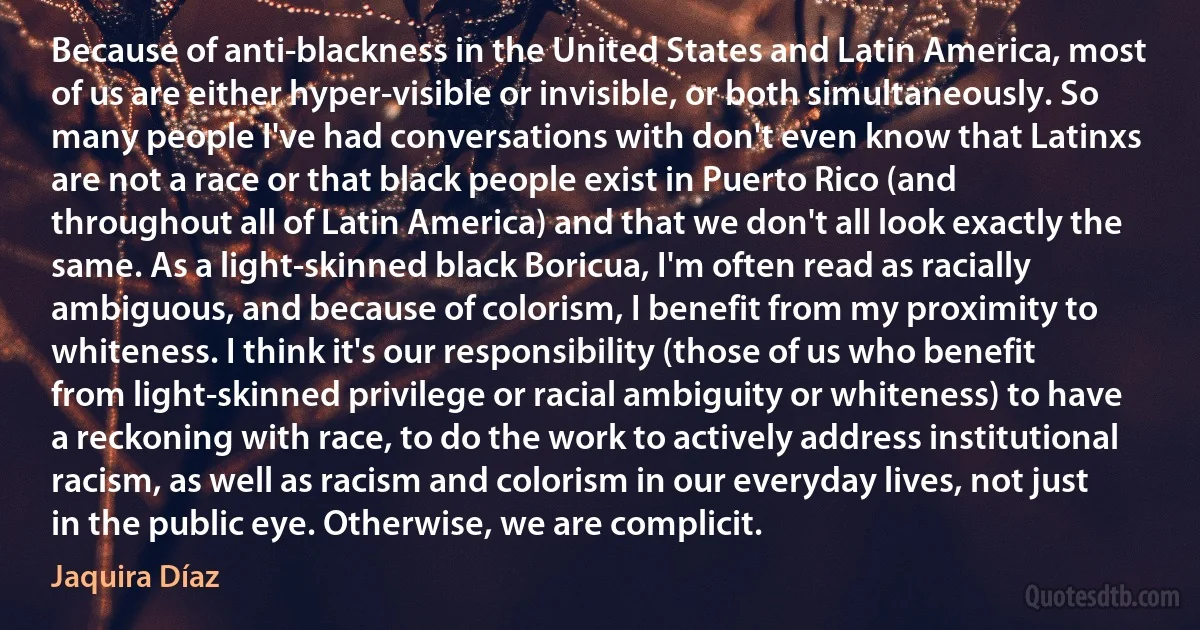
Because of anti-blackness in the United States and Latin America, most of us are either hyper-visible or invisible, or both simultaneously. So many people I've had conversations with don't even know that Latinxs are not a race or that black people exist in Puerto Rico (and throughout all of Latin America) and that we don't all look exactly the same. As a light-skinned black Boricua, I'm often read as racially ambiguous, and because of colorism, I benefit from my proximity to whiteness. I think it's our responsibility (those of us who benefit from light-skinned privilege or racial ambiguity or whiteness) to have a reckoning with race, to do the work to actively address institutional racism, as well as racism and colorism in our everyday lives, not just in the public eye. Otherwise, we are complicit.
Jaquira DíazRelated topics
ambiguity benefit black eye latin lives people proximity public race racial read think well work RICO racism StatesRelated quotes
Our last call in Zagreb before returning to Washington was on U. N. Secretary-General Boutros-Ghali's senior representative in the former Yugoslavia, Yasushi Akashi, whom I had known since my two visits to Cambodia in 1992. Akashi had been harshly treated by the press and castigated by critics of the U. N. for his weakness. But it was entirely not his fault: he was operating under tight constraints imposed by Boutros-Ghali. Furthermore, Akashi was virtually ignored by General Janvier and the U. N. military. (...) He was leaving Zagreb with his previously distinguished records blemished, but his mission had been doomed from the start beacuse of limits imposed from New York. The United States was delighted with his replacement: Kofi Annan (...), the U. N. official in whom we had the greatest confidence, and his arrival was good news.

Richard Holbrooke
When all is said and done, I hope that when the people of our country next return the White House for a time to the Democratic Party, our leadership then will be big enough to salute the present administration for what it will have done that is wise and good. And to build upon it forthrightly.
Towards that end, we must now expand our concept of what is needed to reach the goals upon which we all agree. The United States needs to create a world made more just and more hopeful, not just a world made more profitable for ourselves. I hope that this President's record makes it damn hard for the competition to complain about his record in foreign policy. That may be bad for the loyal opposition. But it's good for the people, who deserve it. And I promise my support for whatever he may do in support of that prayer.

Al Gore
For The United States, the leading space faring nation for nearly half a century, to be without carriage to low Earth orbit and with no human exploration capability to go beyond Earth orbit for an indeterminate time into the future, destines our nation to become one of second or even third rate stature. While the President's plan envisages humans traveling away from Earth and perhaps toward Mars at some time in the future, the lack of developed rockets and spacecraft will assure that ability will not be available for many years.
Without the skill and experience that actual spacecraft operation provides, the USA is far too likely to be on a long downhill slide to mediocrity. America must decide if it wishes to remain a leader in space. If it does, we should institute a program which will give us the very best chance of achieving that goal.

Neil Armstrong
One theory is that the antichrist will be a major political leader in the United Nations and the "many” referred to is the UN. Another theory is that the "many” refers to the Arab League of Nations since their mosques are now on the temple mount where the temple needs to go. Many believe there is room to put the temple on a ten-acre plot north of the two mosques. The temple mount is about 37 acres. Keep an eye out for a treaty that allows Israel to rebuild the temple! If one is made, start the clock ticking again for that final week! It may be the Muslims will offer to trade the Jews ten acres on the temple mount to build their temple, for the entire West Bank? Plus five gazillion dollars! Israel wants that spot bad enough to pay any price. We'll see.

Kent Hovind
WHAT HAPPENS AFTER DEATH?
When a human soul goes out of the body, some great mystery happens. For if it is guilty of sins, then there come hordes of demons, evil angels and dark forces, take that soul and drag it to their side.
No one should be surprised at that, because if a man surrendered and fell prey to them while still alive in this world, will not they have even greater control over him and enslave him when he departs from this world?
As for the other, the better part of people, something different happens to them. There are Angels around the holy servants of God in this life; the holy spirits surround them and protect them; and when their souls are separated from the body, the choir of Angels welcomes them into their fellowship, into a bright life, and thus leads them to the Lord.

Macarius of Egypt
